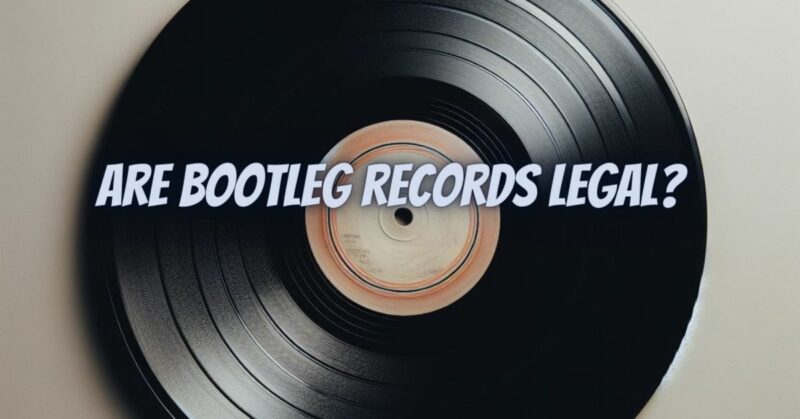In the world of vinyl records, collectors and enthusiasts often come across bootleg records – unauthorized copies of music albums. The question of their legality has sparked debates and discussions among music aficionados, collectors, and legal experts alike. In this comprehensive article, we will delve into the complexities surrounding the legality of bootleg records.
Understanding Bootleg Records
Bootleg records, commonly referred to as “bootlegs” or “counterfeit records,” are unauthorized reproductions of commercially available or unreleased music albums. These records are typically produced without the permission of the copyright holder, who is usually the artist, record label, or music publisher. Bootlegs can encompass a wide range of music genres, including rock, jazz, hip-hop, and more, and may include live performances, alternative studio recordings, or unreleased tracks.
The Legal Landscape
The legality of bootleg records varies depending on several factors, including jurisdiction, copyright laws, and enforcement practices. Here are some key considerations regarding the legal status of bootleg records:
- Copyright Infringement: In most countries, including the United States, bootleg records infringe upon copyright laws. Copyright law grants exclusive rights to artists and copyright holders, including the right to control the reproduction and distribution of their work. Bootlegs typically violate these rights as they are produced without authorization.
- Sound Recording Act: In the United States, the Sound Recording Act of 1971 made it illegal to manufacture, distribute, or possess unauthorized sound recordings, including bootlegs. This legislation strengthened the legal framework against bootlegging.
- Enforcement Varies: The enforcement of copyright laws regarding bootlegs can vary significantly from one jurisdiction to another. Some countries may prioritize more significant copyright violations over bootlegs, while others may take a stricter stance. However, regardless of enforcement practices, the production and sale of bootleg records are generally considered illegal.
- Fair Use and Public Domain: Some exceptions to copyright law exist, such as fair use and public domain, but these are typically not applicable to bootleg records. Fair use exceptions are limited and rarely apply to bootlegging.
- Personal Use vs. Commercial Sale: While personal possession of bootleg records for non-commercial use may be subject to varying interpretations, selling bootlegs as a commercial enterprise is almost universally illegal. This means that producing or selling bootleg records as a business endeavor is a clear violation of copyright law.
Ethical Considerations
Beyond the legal aspects, there are important ethical considerations associated with bootleg records. Supporting bootlegging can harm artists and the music industry by depriving them of revenue and creative control. Many artists rely on income from their music to sustain their careers and fund future projects.
In summary, the legality of bootleg records is influenced by copyright laws, jurisdiction, and enforcement practices. While the legal landscape may have nuances, the fundamental principle remains that bootlegs typically infringe upon copyright laws. Collectors and music enthusiasts should be aware of these legal complexities and consider the ethical implications when deciding whether to purchase or possess bootleg records.
Supporting official releases and respecting the rights of artists and copyright holders is not only a legally sound choice but also a way to contribute to a thriving and sustainable music industry. The question of whether bootleg records are worth the legal and ethical risks ultimately rests with individual collectors and their values and priorities.


